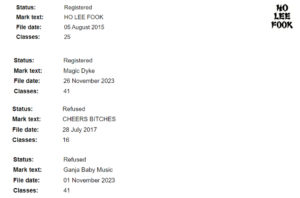Keeping It Clean: How Morality Shapes Trade Mark Law
Written by Cassine Bering | September 16, 2024
There’s nothing wrong with a bit of banter. In fact, many brands base their entire image on their tongue and cheek humour.
However, when applying for a trade mark in the UK, it’s important to know that there is a line and you should take care not to cross it (this goes for most other jurisdictions too!).
Under Section 3(3)(a) of the Trade Marks Act 1994, UK trade mark applications may be refused if they are offensive, meaning they go against public policy or accepted moral standards.
Offensive Trade Marks: What is “Contrary to Public Policy or Morality“?
In simpler terms, this means that a trade mark will be refused if it goes against what is generally acceptable in society, either in terms of legality or morality.
Here are some examples:
- Illegal Activities: If a trade mark makes references to illegal drugs or encourages illegal behaviour, it is likely to be refused. For instance, a mark with references to drug use, drug names or promoting violence could be rejected.
- Morality and Outrage: This part is more subjective since what one person finds offensive might be acceptable to another. Generally speaking, the UK Trade Mark Registry refuses marks that would cause outrage to a significant part of the population. These are marks that cross the line into being deeply offensive or insulting. Some examples could include:
- Marks with racist or homophobic language or symbols
- Use of strongly offensive language (such as swear words)
- Misuse of religious symbols in a way that could deeply offend people of that religion
Even if your mark uses offensive language in an attempt to reclaim that language, the trade mark office can refuse it if the language is likely to be understood as offensive by most people. You have to remember that your trade mark is often the first thing a person sees before they have chance to consider the context of the brand or person using the mark.
In short, marks that could provoke outrage or serious discomfort within the public are likely to be refused under this rule and you should avoid them if you want an easier route to trade mark registration.
How to Avoid Refusal
To sum up, when applying for a trade mark in the UK, make sure your mark doesn’t promote illegal activities or contain anything likely to cause serious offence to the public.
If it does, consider changing the mark, creating a logo mark or redacting or respelling the mark in a way that could cause less offence. These are not silver bullets, and over the years we have seen applications attempt this with varying results. However, sometimes a cheeky trade mark application that pushes the boundary of morality gets through, with a bit of luck and creativity … we just would not recommend it.
Here are some of our favourite attempts – some successful, some not:


